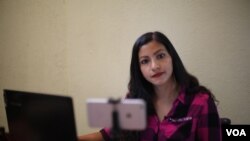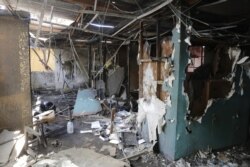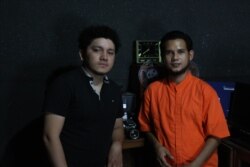Paola Celeste Torres knows all too well the dangers for journalists in Nicaragua. She was working in the Radio Dario building in the city of León in April 2018 when arsonists set fire to the station.
The attack, which destroyed the station’s equipment, took place during a period of unrest and mass protests against the government of Daniel Ortega that year.
“The flames did not destroy our voice, nor the freedom to express ourselves and continue to inform,” Torres told VOA. “But after that terrorist attack, we remained firm, with the desire to inform.”
No one was arrested for the attack, but the station’s director and journalists suspected supporters of Ortega.
Torres is director of Sin Censura, or Without Censorship, a news outlet that broadcasts via social media. "We had a regular radio [broadcast], but seeing that we couldn’t continue working in the same location, we decided to move it to Facebook,” said Torres.
Sin Censura used to be produced in the Radio Dario studios, but since the fire it has grown as a social media news platform focused on local stories. It has around 120,000 followers on Facebook and an audience that reacts and comments on the reporting.
New media projects like Sin Censura are filling the gaps left in Nicaragua’s restrictive environment.
The situation for the country’s media worsened in the wake of the 2018 protests. Several journalists went into self-imposed exile to avoid retaliation; those reporting in the field face violence; and independent outlets are censored or harassed, according to media watchdog Reporters Without Borders (RSF). The country scores 121 out of 180, where 1 is the freest, on RSF’s annual World Press Freedom Index.
Nicaraguan officials say the government respects press freedom. But one official with whom VOA spoke said that some journalists “fall into debauchery.”
Wilfredo Navarro, a deputy in the ruling Sandinista party, told VOA that “the media makes up news and says anything. ... Journalists say what they want. They invent what they want.”
Innovation during adversity
Using a similar model as Sin Censura, the podcast Primer Orden, or First Order, uses social media to distribute its daily news summaries.
Its founder, José Cardoza, records the news show in a small room, improvised as a radio studio, in Managua, then distributes it on multiple platforms.
The podcast initially started as a hobby for Cardoza in 2018, because his other job in public relations didn’t allow him to dedicate himself “fully to journalism.” Cardoza decided to use the pandemic and recent unemployment as an opportunity.
Since its creation, the format has varied. “Currently it is a little more adapted to the needs of the audience; to be informed in a few minutes,” Cardoza said. “In the first six minutes you already know what the situation is in Nicaragua.”
The Primer Orden newscast now has a team of five who collaborate daily to produce content.
Running a podcast has advantages, but the journalists still face obstacles. Like others in media, they receive threats, face police harassment and lack financial support.
“The advantage is technology, the internet. You can listen to it again, share it and even be able to download it. However, you go to a conference to get an interview and you find a huge number of policemen outside the event," said Javier Bermúdez, a Primer Orden journalist.
The same problems affect more traditional media.
Aníbal Toruño, director and owner of Radio Darío in León, said he admires the ability of his team to report despite the pressure and threats from police and government officials.
“I see it as a great opportunity and a testament to the environment in which you work, that if you could reach 50,000 people, now you can reach 100,000 or 150,000,” said Toruño.
Cooperation and support among colleagues and associations with other media are a bonus, Toruño said, adding that competition among outlets is over.
The municipal Radio Camoapa Estéreo, which covers Nicaragua’s central region, relies on collaboration and a few journalists.
“We have a network of friends who are there, they help us and support us, people who send us contributions,” said Juan Carlos Duarte Sequeira, its co-founder. “Many of us earn absolutely nothing, we have no salary. We are simply here because we believe in the project."
The country’s media also face obstacles from legislation, including a cybercrime law approved in October. The law establishes fines and in some cases jail time for spreading “false news.”
Journalists and members of Nicaragua’s opposition raised concerns about the law, pointing out that other legislation has been used to retaliate against critics.
"We have seen other colleagues to whom previous laws have been applied, accusing them of defamation, and receiving a prison sentence, even when they have not committed any crime," said Torres, of Sin Censura.
The journalist believes the law is a tool to punish the media and journalists, but her team put fear aside. “If we allow ourselves to be overcome by fear, we will close down and what will become of independent media? Communication? The people will be most affected."
Government deputy Navarro denied the cybercrime law is aimed at media.
“Journalists can say what they want,” Navarro told VOA. “What we want to do with the cybercrime law is to prevent online sexual trafficking," as well as "ensure that the internet is not used to generate chaos.”
Uncertain future
Media professors from private universities in León told VOA there is disenchantment with prospective students. In 2018, they received more than 80 applications. In 2021, only three.
The professors, who asked that they and their institutions remain anonymous out of security concerns, said many students were disappointed to see the police repression.
“They go for an assignment; and we tell them to take photos and images. And they experience firsthand when the police or other people ask them what they’re doing and demand photo ID,” one of the academics said.
Many also do not see journalism as a profitable career, saying you need a second job to survive in media.
Torres said that journalists are more often bearing the financial burden of running their own outlets.
“When we lost sponsors, our advertisements, we had to ... acquire a microphone or a tripod. We had to migrate to other alternative jobs to be able to subsist as individuals and as journalists,” she said.
But Torres, said, “This is my passion, despite everything. Despite having been at Radio Darío when it was set on fire, having seen that terrorist attack against freedom of expression. I’m one of the survivors of the attack on Radio Darío, along with colleagues from Sin Censura … we have to fight.”
This story originated in VOA’s Spanish language division.






